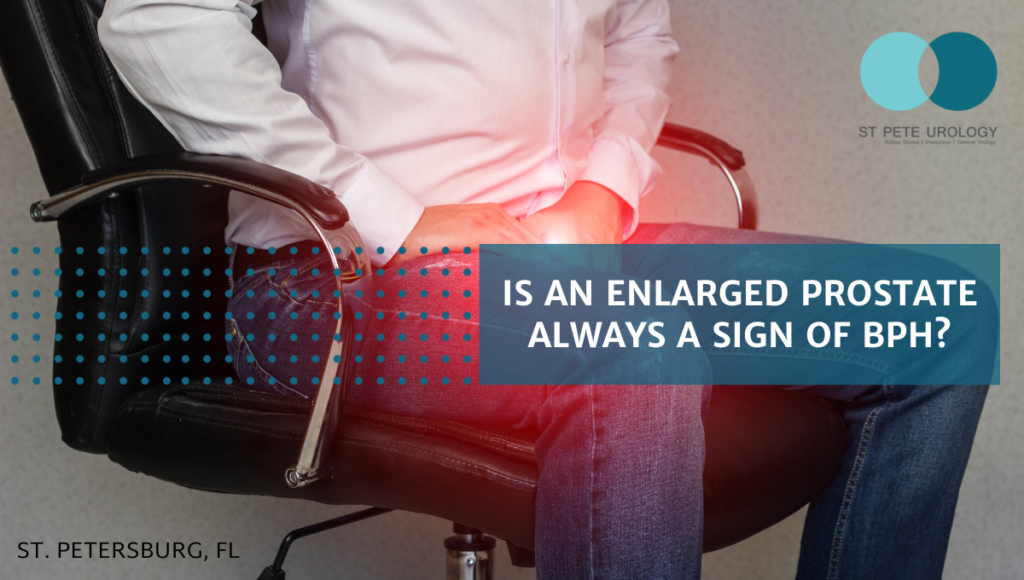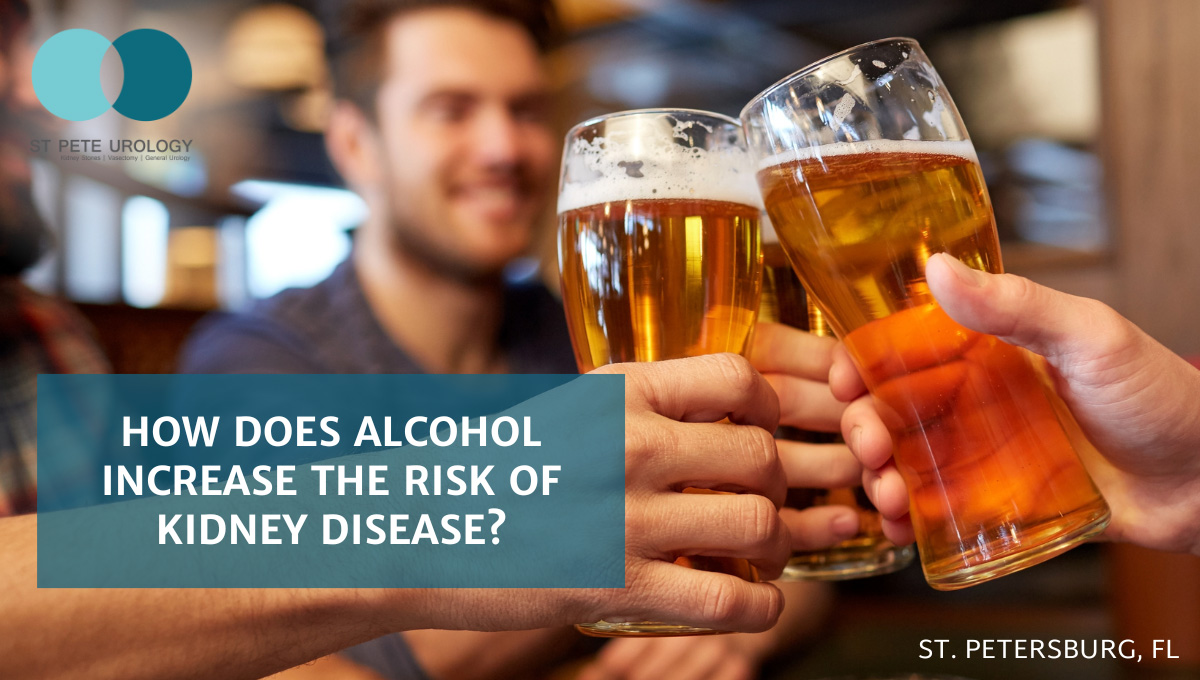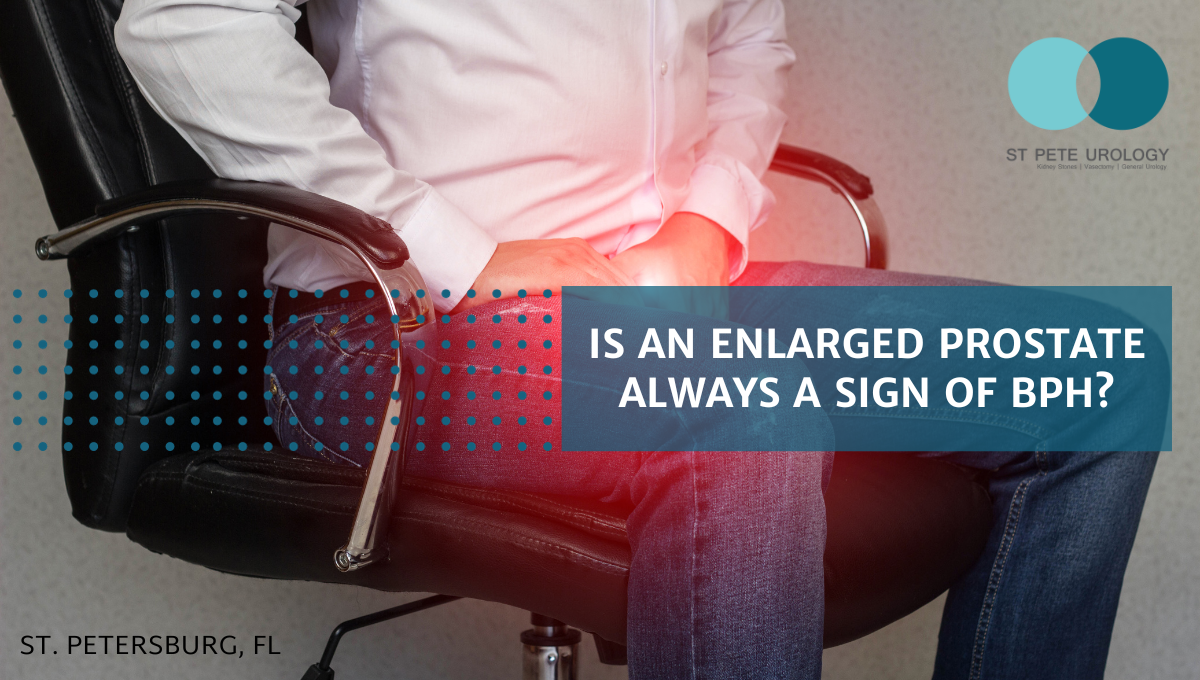Left untreated, overactive bladder can wreak havoc on daily life. Interrupted sleep, stress and anxiety are some of the effects of OAB.
Continue readingImprove Your Urological Health with the Dry January Challenge
Heavy drinking during the holidays? Elevate your urological health now and join the Dry January Challenge for a healthier, revitalized you!
Continue readingHow does Alcohol Increase the Risk of Kidney Disease?
Does alcohol increase the risk of kidney disease? Uncover the intricate relationship between alcohol consumption and kidney health at St Pete Urology.
Continue readingKidney stones: What are your treatment options?
Experiencing kidney stones? What are your treatment options? The severity of the kidney stones may dictate which treatment to get.
Continue readingWhat Are the Primary Factors Leading to Male Infertility?
Understanding the primary factors leading to male infertility is critical to helping you tackle the condition head-on.
Continue readingCan Prostatitis Be Prevented and How?
Understand how can prostatitis be prevented and why is it significantly more beneficial than managing and treatment of the condition.
Continue readingWhat Causes Incontinence
Dr. Nicholas Laryngakis discusses the factors on what causes incontinence and the complications and risks associated with the condition.
Continue readingHow Prevalent Is Erectile Dysfunction and What Are Its Primary Causes?
Key Takeaways:
- Erectile dysfunction is a very common condition affecting around 52% of men globally.
- ED is usually caused by a combination of physical, psychological, and lifestyle factors.
- Professional help from trained medical experts is necessary to diagnose, treat, and manage ED.


In the realm of men’s health, few conditions can be as disconcerting and confounding as erectile dysfunction (ED). Characterized by the chronic inability to achieve and maintain an erection sufficient for sexual activity, erectile dysfunction denotes a significant compromise in a man’s intimate life. It’s essential to understand not only the prevalence of this condition but also its underlying causes to demystify the condition, foster greater awareness, and promote preventative and curative efforts.
Prevalence Of ED: A Closer Look At The Numbers
Primary Causes of ED: The Physical, Psychological, and Lifestyle Factors
More often than not, erectile dysfunction is a composite phenomenon birthed by a blend of physical, psychological, and lifestyle factors. Physical health conditions such as cardiovascular disease, diabetes, hormonal imbalances, and neurological disorders, are often the primary architects of ED. The arteries’ clogging due to heart disease, for instance, can impede blood flow, a crucial element for an erection.
Psychological factors are equally pivotal in instigating ED. The tribulations of anxiety and stress, the gloom of depression, and relationship issues can all transpire into sexual dysfunction. Erectile function is, to a significant extent, a barometer of a man’s mental state.
Lifestyle choices and habits can also conspire to catalyze ED. Smoking narrows and hardens arteries, hampering blood flow. Excessive consumption of alcohol can numb the nervous system, impairing the brain’s capacity to sense sexual stimulation. Sedentary lifestyle, poor diet, and obesity, each have their deleterious impacts on sexual health.
Risk Factors for ED: Beyond the Obvious
Age, although a significant risk factor, isn’t the sole determinant of ED. Other underlying health conditions and psychological factors can predispose individuals to this condition. As a rule of thumb, anything adverse for your heart is likely detrimental to your sexual health.
Closure: Unmasking ED to Seek Solutions
To sum up, erectile dysfunction is a prevalent condition hounded by an intricate blend of physical, psychological, and lifestyle causes. However, understanding the prevalence and primary causes enables individuals to seek professional help for diagnosis and management.
The urologists in FL at St Pete Urology are trained to address this issue comprehensively. They adopt a personalized approach to diagnose, treat, and manage ED, offering a glimmer of hope for millions of those affected. Additionally, they emphasize lifestyle modifications as effective strategies for prevention.
From mitigating risk factors to exploring treatment options, tackling ED is a journey best embarked upon with professional guidance, openness, and optimism. Reach out to the experts at St Pete Urology to begin your journey toward better sexual health. After all, prevention, effective treatment, and the prospect of a healthier life lie within your grasp.
References:
- St Pete Urology. (2023, September 25). Erectile Dysfunction Causes and Treatment Options. St Pete Urology. https://stpeteurology.com/erectile-dysfunction-causes-and-treatment-options-dr-nicholas-laryngakis/
- St Pete Urology. (2023, June 12). St. Pete Urology | Urologists in St Petersburg, Florida. St Pete Urology. https://stpeteurology.com/is-erectile-dysfunction-treatable-exploring-modern-treatment-options/
- And, D. (2023, September 25). Symptoms & Causes of Erectile Dysfunction. National Institute of Diabetes and Digestive and Kidney Diseases; NIDDK – National Institute of Diabetes and Digestive and Kidney Diseases. https://www.niddk.nih.gov/health-information/urologic-diseases/erectile-dysfunction/symptoms-causes
- Nall, R. (2015, March 12). 5 Common Causes of Impotence. Healthline; Healthline Media. https://www.healthline.com/health/erectile-dysfunction/common-causes-impotence#takeaway
- Erectile dysfunction. (2020). Nhsinform.scot. https://www.nhsinform.scot/illnesses-and-conditions/sexual-and-reproductive/erectile-dysfunction-impotence
Erectile Dysfunction Causes and Treatment Options – Dr. Nicholas Laryngakis
Key Takeaways:
- Erectile Dysfunction (ED) affects men of all ages and can have a range of physical and psychological causes.
- Consulting a Urologist is an important step in finding the right treatment for ED.
- St. Pete Urology offers a range of treatments from lifestyle changes and medications to penile prosthetics. They provide insights and support to help patients make informed decisions about their treatment options.


“Erectile Dysfunction, or ED as we commonly refer to it, is a prevalent issue among men, both young and old,” explains Dr. Nicholas Laryngakis, a board-certified urologist with St. Pete Urology. This medical condition, which is more common in elderly patients, affects the lives of many. However, recent observations reveal that younger patients are not immune to this issue. Are you one of the many trying to navigate the often-unspoken difficulties of this condition? Let’s understand the roots of this condition.
Delving into the Causes of ED
The causes of Erectile Dysfunction range across various physical and psychological factors. “It can be due to poor blood flow into the penis or issues with the blood maintaining in the penis,” Dr. Laryngakis shares. Sometimes, a psychogenic component may also lead to Erectile Dysfunction. Don’t let these ED causes deter your journey to a healthy sexual life; understanding is the first step towards finding a solution.
Seeking Professional Help: An Important Step
Choosing to consult a specialist shows your commitment to address any health concern, particularly one as delicate as ED. Dr. Laryngakis and his skilled team at St. Pete Urology are available to guide you through the different stages of ED treatment. “We see patients for Erectile Dysfunction who have either come to us primarily or have exhausted all other options with other physicians,” explains Dr. Laryngakis. Consulting a Urologist is a move towards the right direction, towards reclaiming your health and happiness.
Exploring the Various ED Treatments
St. Pete Urology offers an array of ED treatments, starting from lifestyle changes like diet and exercise to improve erectile function. If non-medicinal methods are unfruitful, medications become necessary. However, if other medications fail, diverse tools such as a vacuum erection device, a urethral suppository or a penile injection may be used to induce an erection.
One of the last resorts is a penile prosthesis which, as Dr. Laryngakis describes, is a “device that is implanted to give the patient an erection when they want to. It’s a permanent internal device and usually, it’s an inflatable penile prosthesis to achieve erections.” This may feel daunting, but remember – it’s a common device used in the United States, and it significantly improves patients’ quality of life.
Entrust Your Health to the Right Hands
Finding the right ED treatment is not a solitary quest. The team at St. Pete Urology, led by Dr. Laryngakis, will walk the journey with you. They provide the insights and support you need to make informed decisions about your treatment options. “At St. Pete Urology, we help patients make the right decision for why they should choose a specific treatment,” assures Dr. Laryngakis.
Your journey to reclaim your health begins here, right in the heart of St. Petersburg, FL. The dedicated team at St Pete Urology understands the intimate nature of ED and is committed to helping you navigate through the various ED treatments available. Your wellbeing is their priority; let them guide you towards a healthier, happier life.
References:
- St Pete Urology. (2013, January 2). St. Pete Urology | Urologists in St Petersburg, Florida. St Pete Urology. https://stpeteurology.com/what-is-the-cause-of-erectile-dysfunction/
- St Pete Urology. (2023, June 12). St. Pete Urology | Urologists in St Petersburg, Florida. St Pete Urology. https://stpeteurology.com/is-erectile-dysfunction-treatable-exploring-modern-treatment-options/
- And, D. (2023, September 25). Symptoms & Causes of Erectile Dysfunction. National Institute of Diabetes and Digestive and Kidney Diseases; NIDDK – National Institute of Diabetes and Digestive and Kidney Diseases. https://www.niddk.nih.gov/health-information/urologic-diseases/erectile-dysfunction/symptoms-causes
- Nall, R. (2015, March 12). 5 Common Causes of Impotence. Healthline; Healthline Media. https://www.healthline.com/health/erectile-dysfunction/common-causes-impotence#takeaway
- Erectile dysfunction. (2020). Nhsinform.scot. https://www.nhsinform.scot/illnesses-and-conditions/sexual-and-reproductive/erectile-dysfunction-impotence
Is an Enlarged Prostate Always a Sign of BPH?
Key Takeaways:
- An enlarged prostate isn’t always indicative of BPH and other conditions, medications, and lifestyle factors can contribute to prostate enlargement.
- Diagnosing BPH isn’t a simple tick-box exercise and a variety of tests may be used to confirm or rule it out.
- If you’re facing symptoms that suggest an enlarged prostate, don’t hesitate to seek expert medical advice.
You may be familiar with the prostate – a small, walnut-sized gland playing a critical role in the male reproductive system. Primarily responsible for the production of seminal fluid, it’s an organ that is often overlooked until something goes wrong, such as the development of Benign Prostatic Hyperplasia or BPH.
What Does an Enlarged Prostate Mean?


An enlarged prostate is exactly what it sounds like: the gland has grown in size. But why? Several factors, including age and hormone levels, can contribute to this enlargement. But does an enlarged prostate automatically equate to BPH?
Unpacking BPH
BPH is a common condition characterized by an enlarged prostate, but not all instances of prostate enlargement signify its presence. BPH symptoms can involve frequent urination, difficulty starting and stopping urination, and feeling as though your bladder isn’t entirely emptied.
The Other Suspects: Beyond BPH
Prostatitis, inflammation of the prostate, or prostate cancer could also be behind your enlarged prostate. Certain medications, too, can induce prostate enlargement as a side effect. You see, diagnosing BPH isn’t a simple tick-box exercise.
The Art of Distinguishing an Enlarged Prostate from BPH
Your urologist will conduct several diagnostic tests to confirm or rule out BPH. This could include a digital rectal examination, urinalysis, or a prostate-specific antigen test. It’s through understanding these results and your symptoms that BPH can be differentiated from other conditions.
Facing BPH: Your Treatment Options
Should BPH be confirmed, a variety of treatment options are available, from lifestyle changes like reducing fluid intake before bedtime to medication. Minimally invasive procedures are often explored before surgical interventions are considered.
The Uncertainty: When an Enlarged Prostate may not Indicate BPH
If your prostate tests show enlargement, but your symptoms don’t match BPH, your urologist may delve deeper into other potential causes. This could involve further tests and evaluations to rule out serious conditions like prostate cancer.
Conclusion: Key Points and the Path Forward
An enlarged prostate isn’t always indicative of BPH, and true symptom relief depends on identifying the correct underlying issue. Other conditions, medications, and even lifestyle factors can contribute to prostate enlargement. Recognizing this is the first step towards relief.
If you’re facing symptoms that suggest an enlarged prostate, don’t hesitate to seek expert medical advice. In St Petersburg, FL, St Pete Urology offers a dedicated team of experienced urologists determined to diagnose accurately and treat effectively, ensuring your prostate health is in the right hands. So, don’t let worries about your prostate keep you up at night, reach out to St Pete Urology, and take control of your health today.
References:
- St Pete Urology. (2013, March 11). What is Prostate Enlargement? St Pete Urology. https://stpeteurology.com/what-is-prostate-enlargement/
- St Pete Urology. (2018, June 13). Prostate Enlargement BPH. St Pete Urology. https://stpeteurology.com/prostate-enlargement-bph/
- And, D. (2023, September 18). Prostate Enlargement (Benign Prostatic Hyperplasia). National Institute of Diabetes and Digestive and Kidney Diseases; NIDDK – National Institute of Diabetes and Digestive and Kidney Diseases. https://www.niddk.nih.gov/health-information/urologic-diseases/prostate-problems/prostate-enlargement-benign-prostatic-hyperplasia
- NHS Choices. (2023). Overview – Benign prostate enlargement. https://www.nhs.uk/conditions/prostate-enlargement/
- Prostate-Specific Antigen (PSA) Test. (2022, March 11). National Cancer Institute; Cancer.gov. https://www.cancer.gov/types/prostate/psa-fact-sheet










